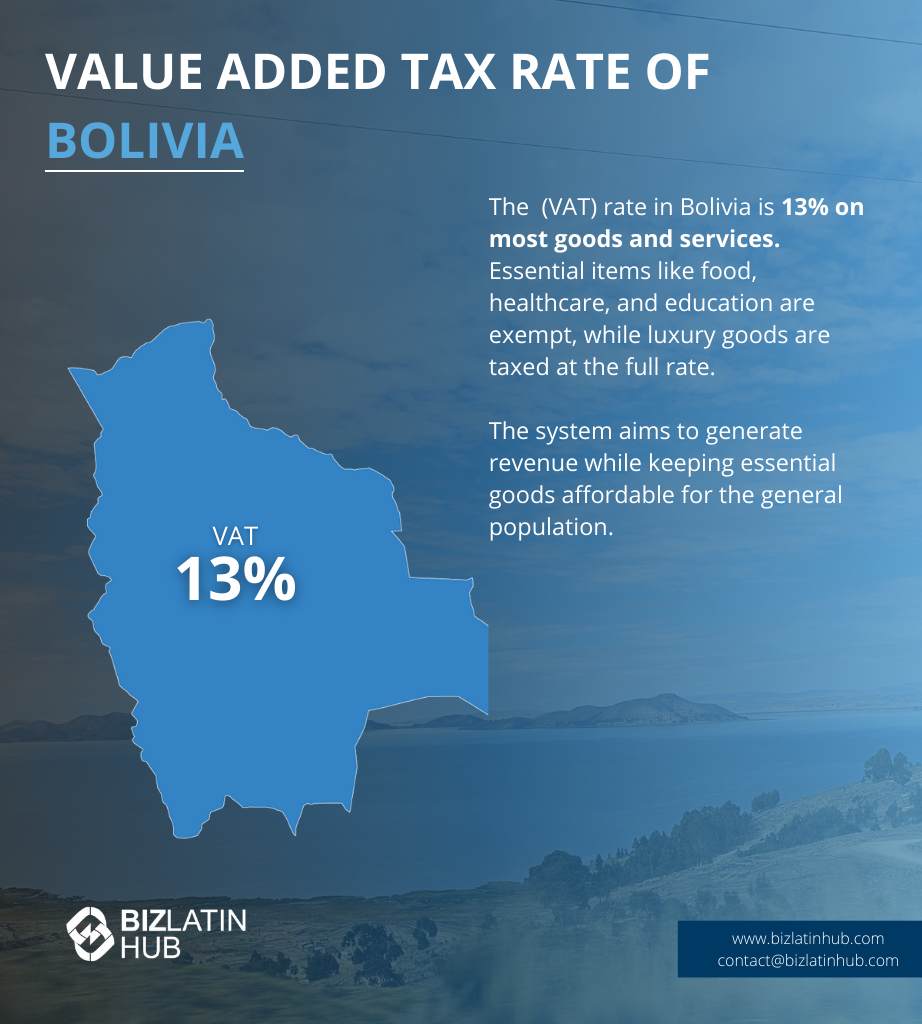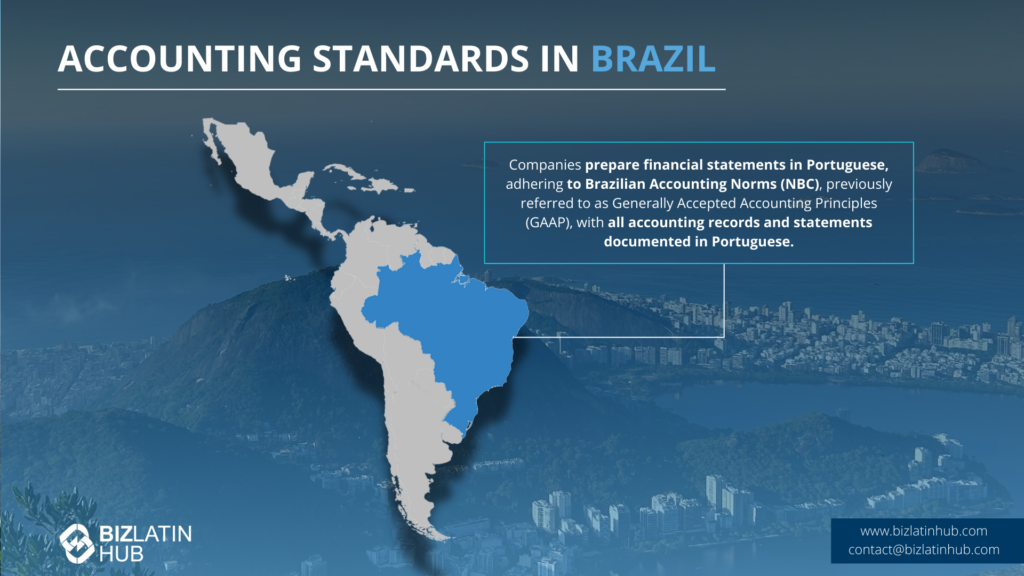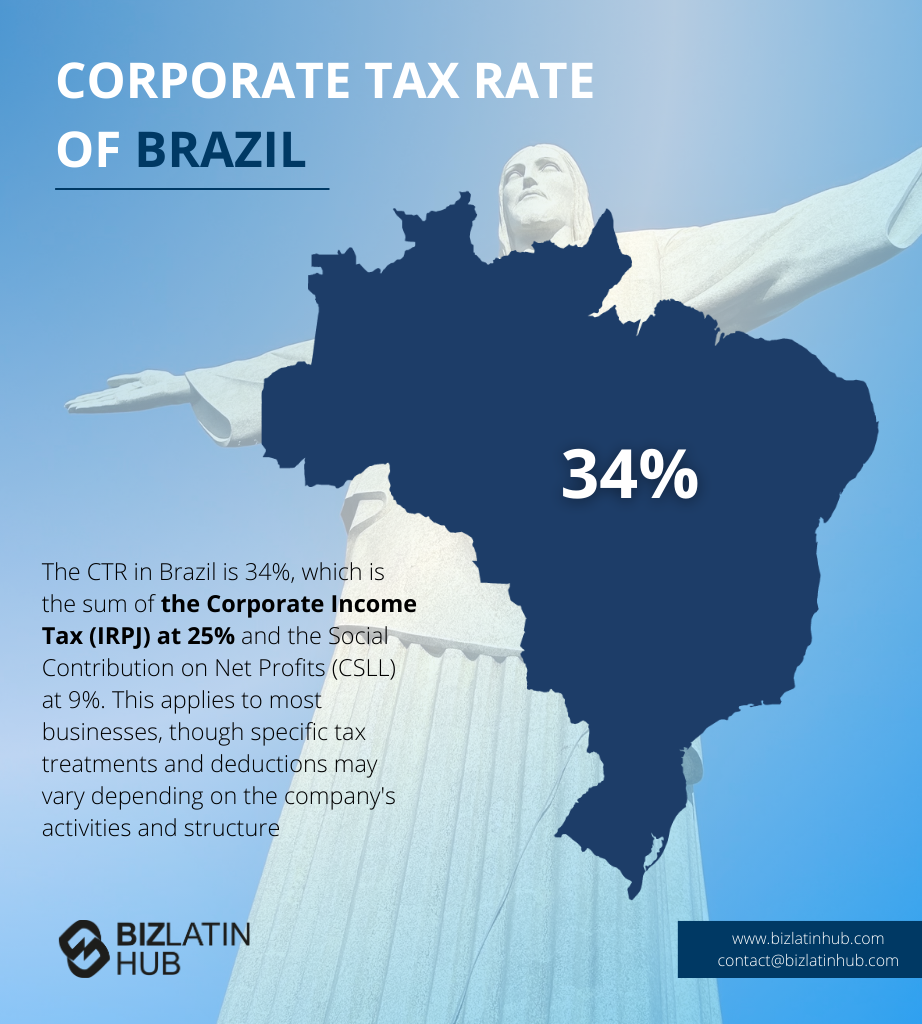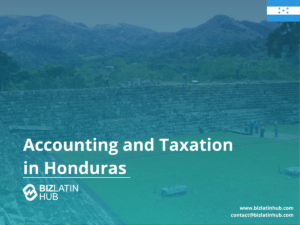Accounting in Brazil must be part of your market entry strategy to successfully register a company in Brazil and remain compliant in a complex business landscape. This guide provides essential information to equip you with the knowledge you need to effectively navigate Brazil’s fiscal intricacies. Biz Latin Hub can help you understand the accounting standards in Brazil that apply to your individual company. We can do the same across the region, thanks to our network of dedicated local offices spanning Latin America and the Caribbean.
Key Takeaways On Accounting in Brazil
| What Are The Accounting Standards in Brazil? | Companies prepare financial statements in Portuguese, adhering to Brazilian Accounting Norms (NBC), previously referred to as Generally Accepted Accounting Principles (GAAP), with all accounting records and statements documented in Portuguese. |
| What Is The Corporate Tax Rate in Brazil? | Corporate income tax (IRPJ) applies to an entity’s taxable profits at a 15% rate. However, including the surtax and the social contribution on net profits the total nominal rate reaches 34%. |
| What Is The Brazilian Value Added Tax Rate? | The current standard VAT rate (ICMS) is set at 17%, but in some states it can be as high as 25%. |
| Dividend Tax Rate in Brazil | Dividends are subject to a “withholding tax” of 15%. |

What are the tax requirements in Brazil?
When incorporating a company in Brazil, several crucial tax considerations must be kept in mind:
- Tax return extensions are not possible.
- An annual paper tax return must be filed before the last working day of April each year.
- Corporate income tax rate averages at 34%, contingent on turnover.
- Federal tax on domestic and foreign products is levied at 1.65%.
- Mandatory social security contribution stands at 7.6%.
- Federal and state VAT taxes apply to various products and services, with rates varying between 7% to 25% depending on the state. This will change in 2026.
What accounting standards are used in Brazil?
Key annual accounting obligations for companies in Brazil include:
- Documenting and implementing accounting procedures.
- Implementing financial accounting software.
- Preparation of financial accounting records.
- Preparing forecasts, budgets, and sensitivity analyses to better manage financial obligations and ease the process of reporting to Brazil’s accounting authorities.
You need to be aware of personal and corporate tax obligations in your country of residence as well. You must fulfill those obligations annually.

Prepare your business for Brazilian legal compliance and laws
Before starting a business in Brazil, familiarize yourself with various laws, including those related to employee benefits, business regulations, and protection as a foreign investor.
For instance, employee benefits in Brazil may vary based on the professional category of your business. Providing meal allowances, transportation allowances, and health plans becomes necessary to comply with labor laws and enhance employee satisfaction.
6 Company requirements in Brazil:
- Your company must have at least one director and one shareholder of any nationality.
- There is no minimum share capital requirement for a Brazilian LLC.
- Annual returns, verifying director names, business addresses, shareholder details, and shareholdings, are mandatory.
- A local registered address is required for private companies.
- Foreign companies must appoint a Brazilian legal representative.
- Restrictions apply to foreigners owning businesses in specific industries.
To exemplify, let’s envision a scenario where a foreign company seeks to establish its presence in Brazil’s aerospace industry. In such instances, securing additional regulatory approvals and ensuring adherence to industry-specific laws become imperative necessities.
Giving employee benefits in Brazil
In Brazil, providing additional benefits for employees is essential, depending on the professional category of your business. These benefits may include meal allowances, transportation allowances, and health plans.
Once you understand your company’s compliance requirements, delve into the laws governing business operations in Brazil.
3 Key Brazilian business laws
Adhering to the following laws is crucial for maintaining business success in Brazil:
- Public companies must publish annual financial statements in a national newspaper.
- For company de-registration, maintaining a resident company secretary and a legal registered office in Brazil is mandatory.
- At least one individual representative must be a resident of Brazil.
For instance, public companies that annually publish financial statements must prioritize compliance with the regulations set forth by the National Financial and Capital Markets Association (Anbima).
Are foreign investors protected in Brazil?
The specific organizations listed below are the ones that protect your business as a foreign investor. Foreign investors also have several outlets that protect their business:
- The Brazilian Export and Investment Promotion Agency (Apex).
- The National Financial and Capital Markets Association (Anbima).
- Cetip.
- Market Information Organization Board (Codim).
- Brazilian Institute for Investor Relations (IBRI).

FAQs when understanding taxation and accounting in Brazil
Based on our extensive experience these are the common questions and doubts from our clients when looking to understand accounting and taxation in Brazil.
The corporate tax rate in Brazil is 34%.
Companies in Brazil follow the tax laws in force in the country and can be calculated based on a presumed percentage of gross revenue or, even, based on net profit.
The RFB (Receita Federal do Brasil), which is responsible for the implementation and regulation of tax and customs legislation in Brazil.
Brazilian accounting standards require companies to prepare their financial statements in Portuguese and accordance with Brazilian Accounting Norms (NBC), formerly known as Generally Accepted Accounting Principles (GAAP). Accounting records and statements must be made in Portuguese.
The equivalent of the CPA in Brazil is the Conselho Federal de Contabilidade (CFC). All accountants must be qualified and registered before the regional accounting council in their region.
In Brazil, all companies must follow the Brazilian Accounting Norms (NBC TG; NBC TG 1000; ITG 1000), within the IFRS standards, according to the size of the company.
Why Invest in Brazil?
Now is an ideal time to invest in Brazil due to its vast natural resources, diversified economy, and strategic global position. The country is a leading producer of commodities such as soybeans, iron ore, and coffee, with growing opportunities in renewable energy, technology, and agribusiness. Brazil’s membership in Mercosur and trade agreements with global markets enhance its role as a key player in international trade.
Ongoing economic reforms and infrastructure development are improving Brazil’s investment climate. Currently, the country is negotiating a new taxation system coming into effect in 2026. Efforts to simplify taxes, modernize industries, and attract foreign capital are driving growth across sectors. With a large domestic market, competitive labor costs, and expanding international partnerships, Brazil offers significant opportunities for businesses seeking to establish or grow operations.
Biz Latin Hub can assist you with accounting in Brazil
Once you understand the accounting process, laws, and legal requirements in Brazil, you are ready to do business there.
Biz Latin Hub is the market leader in helping both local and foreign companies to successfully expand their business in Brazil, by providing a full suite of multi-lingual commercial representation and back-office services.
Contact us today to find out more about how we can support you doing business or read about our team and expert authors.






